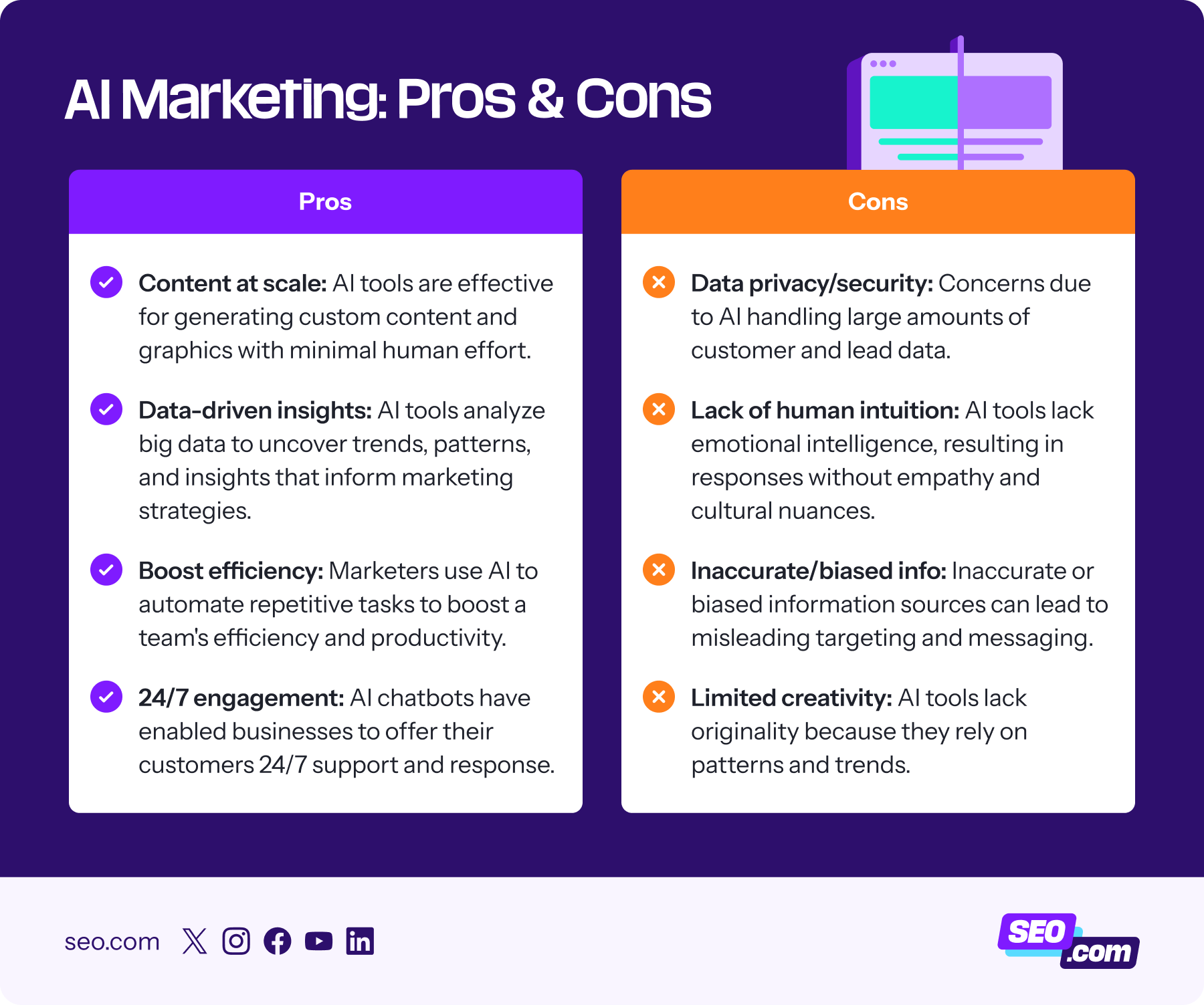Key takeaways
- AI marketing uses AI-powered tools like machine learning, NLP, and LLMs to optimize campaigns, personalize messaging, and analyze data for better marketing results.
- AI enhances marketing through automation, personalization, social listening, and campaign optimization, improving efficiency and customer engagement.
- AI boosts content creation at scale, enables data-driven decision-making, increases campaign efficiency, and provides 24/7 customer engagement via chatbots.
- AI marketing faces data privacy concerns, limited emotional intelligence, potential bias or inaccuracies, and reduced creativity compared with human marketers.
- Effective AI marketing requires defining goals, auditing resources, selecting the right AI tools, creating a strategy, and continuously monitoring and adapting campaigns.
AI is transforming marketing in unforgettable ways, from automating repetitive tasks and generating content to collecting and analyzing consumer insights and data.
The mix of AI and marketing also leads to more targeted and effective digital marketing campaigns, which drive desired results for businesses. AI marketing is expected to contribute at least $16 trillion to the global economy by 2030.
Generative AI tools are a popular tool for AI marketing, and according to the IBM Institute for Business Value’s annual CEO study, over 70% of the highest-performing executives credit their competitive advantage to the most advanced generative AI.
Are you looking to integrate AI marketing into your strategies to maximize results? If so, this guide is for you. Learn how to implement AI marketing through the following topics:
- What is AI marketing?
- How is AI used in marketing?
- AI marketing pros and cons
- How to get started with AI marketing
What is AI marketing?
AI in digital marketing is the use of AI-powered tools and technologies to address key marketing challenges and enhance the likelihood of campaign success. AI in marketing leverages specific technologies to improve how brands reach their targeted audiences, like:
- Natural language processing (NLP): This AI subfield teaches AI programs to understand, interpret, generate, and respond to human language. Examples of NLP in marketing include voice search optimization, chatbots, social listening, and content generation.
- Large language models (LLMs): LLMs are advanced AI models trained to generate human-like responses. Marketers can use LLMs for content creation at scale, hyper-personalized messaging, and automated customer responses.
- Machine learning (ML): ML algorithms analyze vast amounts of data to disclose trends, patterns, and insights that inform your digital marketing efforts. Marketers use ML for lead scoring, customer segmentation, churn prediction, and campaign optimization.
How is AI used in marketing?
AI marketing is set to improve various aspects of digital marketing, particularly for improving customer experience and increasing a business’s bottom line. Below are the main use cases of AI in marketing:
1. Automation
One of the main ways AI is used in marketing is to automate repetitive digital marketing tasks, such as A/B testing, content generation, data entry, and customer engagement. AI marketing automation aims to streamline workflows and improve operational efficiency.
Marketing automation saves businesses time, ensuring they have time to focus on strategy, creativity, and customer engagement. Here are some ways you can automate marketing tasks with AI:
- Scheduling: You can use AI tools like Buffer and Hootsuite to schedule content for your social media pages or website. These tools ensure you post at optimal times using AI when audiences are most engaged, they also keep you on track when juggling multiple campaigns or platforms.
- Brand consistency: Marketers can train generative AI tools like ChatGPT on a business’s voice and guidelines, ensuring they are reflected throughout a company’s digital assets.
- Social media management: AI allows marketers to automate social media management tasks such as content creation, posting, and audience engagement.
- Lead scoring: AI helps to automatically score leads depending on customer insights and behaviors to determine how likely they are to convert.
2. Personalization
Marketing experts are using AI to personalize marketing campaigns, fostering stronger customer connections, boosting customer engagement, and driving conversions. Personalization is also key to maximizing marketing spend and ensuring a high return on investment.
AI enables personalization in marketing by analyzing vast amounts of data to spot trends, patterns, and insights to ensure your content and overall campaigns resonate with your audiences. It also involves behavioral analysis and predictive modeling to recommend products and content to the target audiences.
Generative AI tools, like Jasper and Bard, can help you generate highly personalized content, recommendations, and user experiences that reflect your brand voice and tone and address the customer’s pain points.
You can use these tools to tailor messaging and offerings to individual customer needs and preferences.
3. Social listening
You probably want to know what people are saying about your brand. Other than approaching people one-on-one to hear from them, the Internet now enables you to listen to what people are saying about your brand, industry, and competitors online.
AI fast-tracks social listening thanks to its ability to analyze vast amounts of data in real time, within seconds. This means no stone is left unturned, and you’re conversant with everything that could help you improve your processes and enhance your reputation on and offline.
Through NLP, AI analyzes what’s being said on posts, comments, reviews, online forums, and testimonials. It can also help marketers flag PR risks early, spot impactful trends in your industry, and find gaps or opportunities based on competitor messaging.
4. Campaign optimization
Marketing campaign optimization refers to the process of making real-time adjustments to your marketing strategies to boost efficiency and effectiveness. It involves refining specific digital marketing strategies or campaigns to drive the results and performance businesses want.
AI eliminates the guesswork otherwise involved in marketing optimization by analyzing customer behavior, interests, preferences, demographics, and purchase history. Marketers can also leverage AI keyword generators and other AI tools for marketing to A/B test multiple marketing campaign elements, like copy, headlines, images, formats, and CTAs, to ensure they leverage the best-performing combinations.
With tools like the Meta Advantage+, you can adjust ad campaigns in real-time and even reallocate ad spend to top-performing campaigns, platforms, audiences, and creatives. This ensures you’re maximizing your budget and getting maximum value.
AI marketing pros and cons
As AI becomes a core part of marketing strategies, it’s important to understand both the benefits it brings and the challenges it presents. Below, we break down the pros and cons of AI marketing to help marketers make smarter, more informed decisions.

Pros of AI marketing
When you integrate AI in your marketing, you stand to gain in the following ways:
- Content generation at scale: AI tools are effective for generating custom content and graphics for businesses fast and effectively, with minimal human effort.
- Data-driven decision-making: AI tools analyze big data to uncover trends, patterns, and insights that inform marketing strategies.
- Boost campaign efficiency: Marketers use AI to automate repetitive tasks to boost a team’s efficiency and productivity.
- Around-the-clock customer engagement: AI chatbots have enabled businesses to offer their customers 24/7 support and response.
Cons of AI marketing
Although approximately 50% of companies have already adopted AI in their marketing, 11.5% of companies have yet to adopt it, and another 9.5% have yet to implement it. Here are some cons of AI in marketing that are making some marketers hold off:
- Data privacy and security concerns due to AI handling large amounts of customer and lead data
- Lack of human intuitiveness and emotional intelligence, resulting in responses without empathy and cultural nuances
- Inaccurate or biased information sources, resulting in misleading targeting and messaging
- Limited creativity and intuition because AI tools rely on patterns and trends and lack originality
How to get started with AI marketing
Implementing AI in marketing involves numerous steps to ensure it runs smoothly and maximizes your results. Here are the steps you must follow to unlock the power of AI for marketing:
- Define your marketing goals: Understanding your marketing goals helps you understand the right AI tools to reach your goals.
- Audit your online resources: Look at your website and social media accounts to ensure you provide your audiences with accurate and comprehensive information. Ensuring you provide AI tools with accurate information helps to minimize biases and hallucinations from AI tools.
- Choose the right AI tools: You must select AI tools that align with your marketing goals, company size, budget, and technical capabilities.
- Create a plan: Draft a detailed AI marketing strategy, covering how you’ll improve your marketing return on investment (ROI) with artificial intelligence.
- Adapt: AI in marketing is not a set-it-and-forget-it project. It requires you to consistently monitor performance and results and adapt them to your marketing strategy as new AI tools and techniques become available.
You can learn about implementing AI in marketing with examples from industry-leading companies, like Netflix, Starbucks, and Nike, who’ve already done it successfully. Learn more about examples of AI in marketing in this article.
Transform your marketing strategy with AI services
Are you looking to transform your marketing and gain a competitive edge? Then it’s time to incorporate AI into your digital marketing strategy. Yes, you can do it yourself, but you can fast-track and future-proof your AI marketing strategy with help from an AI marketing agency.
At SEO.com, we offer reliable AI SEO services to help you maximize your organic visibility on the 360° search landscape. Even better, our integrated SEO solution — OmniSEO™ — achieves brand visibility across all search engines.
With OmniSEO™, you get access to AI and digital marketing experts, diversify your traffic sources, and unlock AI insights. Request a free OmniSEO™ or call us at to start future-proofing your AI marketing strategies.
Beat Your Competitors Tomorrow
Be where your customers are and your competitors aren’t- AI search results. See how with OmniSEO®!


Beat Your Competitors Tomorrow
Be where your customers are and your competitors aren’t- AI search results. See how with OmniSEO®!

Writers

Related Resources
- A Tell-All Guide to AI Browsers: What They Are and How They Impact Search and Google
- AEO vs. SEO: Key Differences and Importance in Digital Marketing
- AI Advertising in 2026: Use Cases, Tools, and Best Practices
- AI and SEO
- AI Overviews: Everything You Need to Know As an SEO
- AI Search Trends for 2026 That Will Shape Your Future Strategy
- AI SEO Statistics in 2026: AI SEO Trends and Insights
- An Exploration into the Newest ChatGPT Experience: ChatGPT Pulse
- Are AI Search Engines the Future of Search? Everything You’ll Wish You Knew Sooner
- Do I Need GEO? Yes, if You Want to Stay Agile in 2026 and Beyond

